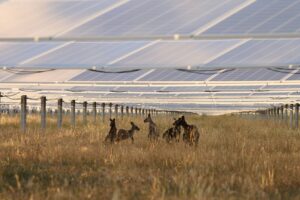Origin Energy says the dramatic price spikes that occurred in the wholesale electricity market in South Australia and elsewhere over the past month were entirely predictable, perfectly normal, and should not have affected any major energy users.
Origin CEO Grant King said that “99.999 per cent” of customers would not have been required to pay the higher electricity prices, and that those who did would do so only as a result of a failure to hedge against the spot market.

The South Australian price spikes have become a major issue in the Australian energy market. Even though price spikes were common before the advent of wind and solar, the latest rises are being used by many in the fossil fuel industry as an argument against building more wind and solar.
The incumbents are also asking for restrictions on gas supply to be lifted (i.e. removing bans on coal seam gas), while the renewable energy industry says more gas is not the solution, but more competition is. They argue this should come from battery storage and dispatchable renewable energy, such as solar towers.
The controversy has been deepened by a series of reports that point to the price hikes being the result of “gaming” in the market, including the withholding of one-third of gas-fired generation capacity at the height of the crisis in early July.
The issue is to be discussed at a meeting of federal and state energy ministers on Friday, with the federal Coalition likely to make a series of proposals to increase the supply of gas.
King, in a briefing to energy market analysts coinciding with the company’s annual results announcement, said his company had briefed many state and federal energy ministers ahead of the summit. Its chief message to the minister was that the “market works.”
“Our message was don’t be spooked by electricity prices spiking to $10,000/MWh, or gas spikes to $18/petajoule. It’s perfectly normal. It’s perfectly able to be predicted.”
King said if people found themselves caught out by such price spikes, as some leading energy users had complained, it was the result of a failure in their own risk management. “It’ not a failure of the market.”
Three weeks ago, RenewEconomy revealed how gas generators in Australia had cashed in on the price spikes, lifting revenue by around $190 million over the period. A new report from the Climate Council to be released later today is expected to confirm that.
This follows other reports, by the Melbourne Energy Institute’s Dylan McConnell and by energy analyst Bruce Mountain of gaming in the market, and the withholding of capacity.
Mountain’s report said gas generators would have received a revenue boost of $46 million on one day alone. The Clean Energy Council has also complained about price spikes in the provision of “ancillary services”, again from a lack of competition in the market, just as gas generation companies fight against rule changes that could encourage more battery storage and more competition.

Origin Energy said it had reduced its own exposure to spiking wholesale prices (it needs to either generate its own power or buy from the market to service its customers) by increasing the amount of hedging contracts – see graph above. This helped limit the increase in its cost of electricity to just 90c/MWh, compared to significant jumps in market prices.
Origin Energy, however, admitted that its profits from the high-priced period – coinciding with a jump in gas prices, a cold snap in Victoria, and repairs to the interconnector – were hit badly by an unexpected outage at its main coal generator, Eraring in NSW.
As RenewEconomy reported last week, Eraring was one of a number of coal-fired generators across the country that had sudden and unexplained outages due to technical problems at their plant.
In the case of Eraring, the loss of two units due to “boiler tube” problems cost it $20 million in late June. The two units were also impacted in the first week of July, likely leading to further revenue hits.
The unplanned outages, said head of energy markets Frank Calabria, forced Origin to go back into the market and buy power at high spot prices to make up for the lost production.
King said that despite the high gas prices, he saw gas-fired generation as being an essential part of the transition to a clean energy future, along with renewable energy.
“A transition without gas cannot occur in a way that will produce reliable, affordable and sustainable supply energy,” he said.








